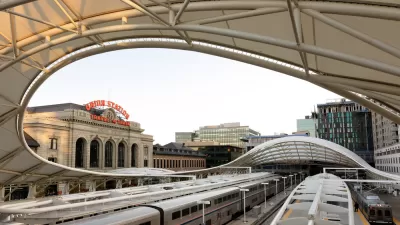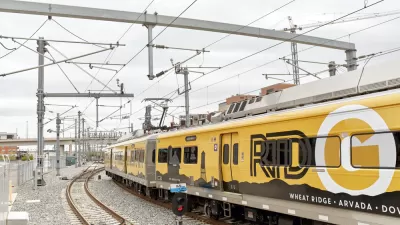The 6.2 mile, two-station electrified commuter rail line is opening as expected next Monday, July 25, but future service to the northwestern counties of Broomfield and Boulder will be delayed due to an unexpected funding shortfall.
Festivities for the Regional Transit District's (RTD) new B Line are planned at the line's two initial stations, Union Station and Westminster Station, located in the northwest suburb of Westminster, a city of 106,000 (2010 census), located in Adams and Jefferson counties.
"The 11-minute, one-way ride will cost $2.60," reports John Aguilar for The Denver Post. However, residents in Broomfield and Boulder counties will have to wait for some time before they see service.
But for many living farther up the northwest corridor — in communities such as Broomfield, Louisville, Boulder and Longmont — the B-Line opening will feel less satisfying. Louisville Mayor Bob Muckle characterized his invitation to the ribbon-cutting at the new Westminster Station...as “sort of bittersweet.”
Courtesy of Regional Transit District (RTD)
The delay results from a severe funding shortfall due to "tax revenue projections that outstripped collections and higher-than-anticipated construction costs...much of it falling disproportionately on the northwest corridor," adds Aguilar.
It may even take as long as 2042, depending on the cash flow situation at the RTD, before the full line is up and running.
An October 2013 post compares rail vs. bus rapid transit for the corridor. At that time, light rail, not commuter rail, was being considered.
Unlike the 23-mile, eight-station A Line from Union Station to Denver International Airport, with headways of 15 minutes, the initial B Line to Westminster will have half-hour peak and hourly off-peak headways.
RTD will open two more rail lines this year: the G commuter rail line in the fall and R light rail line extension in winter.
Hat tip to Annie Dawid.
FULL STORY: B-Line opening forges rail link to Denver’s northern suburbs for the first time

Alabama: Trump Terminates Settlements for Black Communities Harmed By Raw Sewage
Trump deemed the landmark civil rights agreement “illegal DEI and environmental justice policy.”

Planetizen Federal Action Tracker
A weekly monitor of how Trump’s orders and actions are impacting planners and planning in America.

Why Should We Subsidize Public Transportation?
Many public transit agencies face financial stress due to rising costs, declining fare revenue, and declining subsidies. Transit advocates must provide a strong business case for increasing public transit funding.

Understanding Road Diets
An explainer from Momentum highlights the advantages of reducing vehicle lanes in favor of more bike, transit, and pedestrian infrastructure.

New California Law Regulates Warehouse Pollution
A new law tightens building and emissions regulations for large distribution warehouses to mitigate air pollution and traffic in surrounding communities.

Phoenix Announces Opening Date for Light Rail Extension
The South Central extension will connect South Phoenix to downtown and other major hubs starting on June 7.
Urban Design for Planners 1: Software Tools
This six-course series explores essential urban design concepts using open source software and equips planners with the tools they need to participate fully in the urban design process.
Planning for Universal Design
Learn the tools for implementing Universal Design in planning regulations.
Caltrans
Smith Gee Studio
Institute for Housing and Urban Development Studies (IHS)
City of Grandview
Harvard GSD Executive Education
Toledo-Lucas County Plan Commissions
Salt Lake City
NYU Wagner Graduate School of Public Service





























